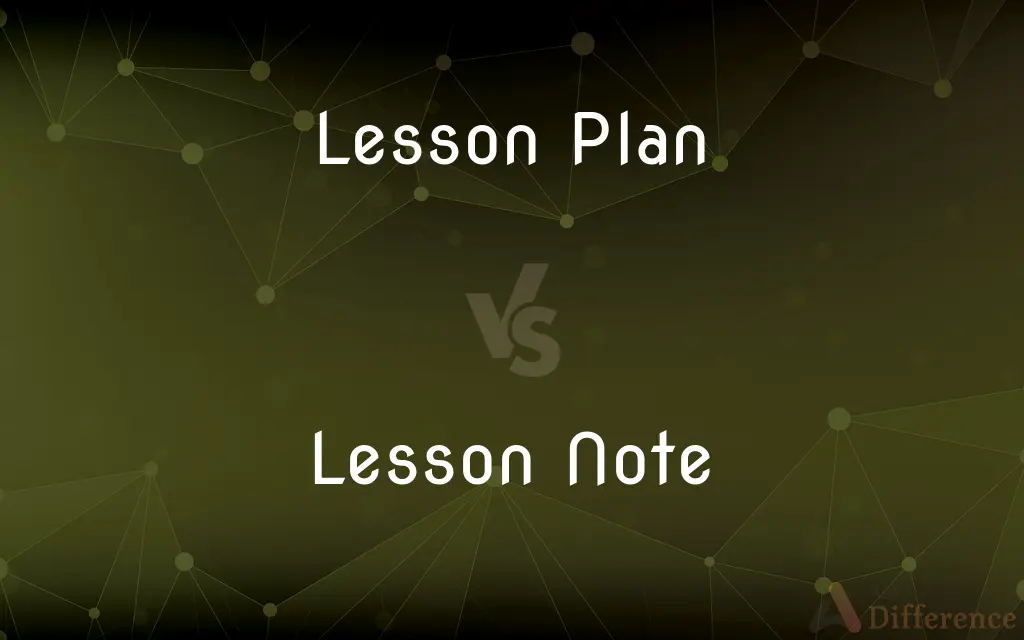Lesson Plan vs. Lesson Note — What's the Difference?
By Tayyaba Rehman — Published on January 27, 2024
A lesson plan is a teacher's detailed guide for a specific lesson, outlining objectives, materials, and a step-by-step process. Lesson notes are personal notes a teacher takes during or after a lesson, reflecting on its execution and student response.

Difference Between Lesson Plan and Lesson Note
Table of Contents
ADVERTISEMENT
Key Differences
Lesson Plan: A lesson plan is a formal, structured document prepared before a lesson. It outlines the goals, teaching strategies, activities, and assessment methods for that lesson. Lesson Note: Lesson notes are informal records made by a teacher, often containing observations, student feedback, and personal reflections on the lesson’s effectiveness.
Lesson Plan: The plan serves as a roadmap for conducting a class, ensuring all necessary topics and activities are covered. Lesson Note: Lesson notes serve more as a journal or diary of classroom experiences, useful for future reference and adjustments.
Lesson Plan: It is typically detailed and can be shared with others, such as substitute teachers or administrators, to maintain consistency in teaching. Lesson Note: Lesson notes are generally personal and might not be comprehensive enough for others to use without the teacher’s input.
Lesson Plan: Lesson plans often include specific time allocations for each activity to manage classroom time effectively. Lesson Note: Lesson notes may mention time management aspects of the lesson, noting what activities took more or less time than planned.
Lesson Plan: They are an essential tool for teacher preparation and organization. Lesson Note: Lesson notes are valuable for self-reflection and professional development, helping teachers evolve their teaching strategies.
ADVERTISEMENT
Comparison Chart
Nature
Formal, structured document
Informal personal records
Purpose
Guide for conducting a specific lesson
Reflecting on the execution and effectiveness
Usage
Preparing for class, can be shared
Personal reference, professional development
Content
Objectives, materials, steps, time allocation
Observations, feedback, reflections
Benefit
Ensures consistency and thoroughness
Assists in adjusting future teaching strategies
Compare with Definitions
Lesson Plan
Lesson plans often include methods for assessing student understanding.
The lesson plan included a quiz at the end to assess learning.
Lesson Note
They often contain observations on student behavior and participation.
In his lesson notes, he wrote about the class's reaction to the new topic.
Lesson Plan
It includes the objectives and goals of the lesson.
The lesson plan clearly stated the learning outcomes for the students.
Lesson Note
Lesson notes are a teacher's personal reflections on a lesson's delivery.
Her lesson notes included thoughts on how to improve student engagement.
Lesson Plan
A lesson plan is a teacher's organized outline for a specific class session.
Her lesson plan included a detailed breakdown of the class discussion topics.
Lesson Note
They can record what worked well and what didn’t in a lesson.
His lesson notes mentioned that the group activity was very effective.
Lesson Plan
A lesson plan outlines the materials and resources needed for the class.
He checked the lesson plan to ensure all materials were prepared.
Lesson Note
Lesson notes are used for self-evaluation and professional growth.
Reflecting on her lesson notes, she planned to change her approach to certain topics.
Lesson Plan
It provides a step-by-step guide on how to conduct the lesson.
Following the lesson plan helped her stay on track during the class.
Lesson Note
Lesson notes may include ideas for future lessons or modifications.
She jotted down in her lesson notes to use more visual aids next time.
Common Curiosities
Can lesson plans be reused?
Yes, lesson plans can be reused or adapted for similar classes or topics.
How detailed should lesson notes be?
Lesson notes vary in detail based on the teacher’s preference, but they should capture key observations and reflections.
How are lesson notes used by teachers?
Teachers use lesson notes to reflect on the effectiveness of a lesson, student engagement, and to make notes for future improvements.
Are lesson notes shared with others?
Lesson notes are usually personal and not typically shared, unlike lesson plans which can be shared with colleagues.
Can lesson notes influence future lesson plans?
Yes, insights from lesson notes can significantly influence the preparation of future lesson plans.
Do lesson plans include interactive activities?
Yes, lesson plans often include interactive activities to engage students and facilitate learning.
Can lesson notes help in addressing individual student needs?
Yes, lesson notes can help identify individual student needs and areas for additional support or challenge.
What is typically included in a lesson plan’s structure?
A lesson plan typically includes objectives, materials needed, a step-by-step process, and assessment methods.
What is the primary purpose of a lesson plan?
The primary purpose of a lesson plan is to outline the structure and content of a specific lesson to achieve defined objectives.
Is a lesson plan mandatory for every class?
While not always mandatory, having a lesson plan is highly recommended for effective teaching and organization.
How can lesson notes improve teaching methods?
Lesson notes can provide insights into what teaching methods are most effective, allowing for adjustments and improvements.
Is it common for teachers to share their lesson plans?
Yes, it’s common for teachers to share lesson plans, especially within a department or team, to ensure consistency and collaboration.
Should a lesson plan align with curriculum standards?
Yes, lesson plans should align with curriculum standards to ensure the lesson meets educational requirements.
Do lesson notes focus more on student or teacher performance?
Lesson notes focus on both student performance and the effectiveness of the teacher's delivery and methods.
How long in advance should a lesson plan be prepared?
A lesson plan should be prepared well in advance, giving enough time for gathering resources and planning activities.
Share Your Discovery

Previous Comparison
Potassium Chloride vs. Potassium Citrate
Next Comparison
iPhone vs. iPhone CloneAuthor Spotlight
Written by
Tayyaba RehmanTayyaba Rehman is a distinguished writer, currently serving as a primary contributor to askdifference.com. As a researcher in semantics and etymology, Tayyaba's passion for the complexity of languages and their distinctions has found a perfect home on the platform. Tayyaba delves into the intricacies of language, distinguishing between commonly confused words and phrases, thereby providing clarity for readers worldwide.
















































